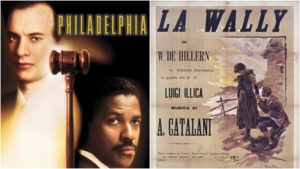
Opera Meets Film: Opera As Character in Jonathan Demme’s ‘Philadelphia’
By David Salazar“Opera Meets Film” is a feature dedicated to exploring the way that opera has been employed in cinema. We will select a section or a film in its entirety, highlighting the impact that utilizing the operatic form or sections from an opera can alter our perception of a film that we are viewing. This week’s installment returns to Jonathan Demme’s “Philadelphia,” which was previously covered.
Not so long we took a look at “Philadelpha” and the famous Maria Callas scene that transcends the film.
But that isn’t the only instance where opera plays a key role in this film. In fact, only looking at that special scene does the remainder of the film a disservice, particularly when opera permeates the film to a rather extensive degree.
Andrew Beckett is defined by opera itself and in some ways, opera is presented as a symbol for his closeted homosexuality and hidden AIDS.
Early on, we hear faint sounds of a soprano singing while Andrew is in his office finishing up an essential project. It is rather off-putting and strange. At times the viewer questions whether he or she is truly hearing opera and what exactly the music is. It is faint and hidden, in the same manner as the characters condition is.
But as the film develops and his condition comes to the fore and becomes the crux of the conflict, we hear opera layered throughout scenes, the presence of the operatic voice growing stronger and stronger.
We then reach the famed “La Mamma Morta” scene which transcends the character of Andrew, imprinting itself on Joe Miller, as noted in a previous installment of “Opera Meets Film.”
The union of Andrew with opera continues into the final scene, during which we hear a familiar aria in the background. Facing his final moments, Andrew and Joe are joined in one final moment of true friend as Catalani’s “Ebben! Ne andro lontano” plays on in the background. It is undeniably the perfect aria for the moment, the fusion of operatic text synchronized with the action of the scene.
The entire aria talks about Wally preparing for a journey far away, alone. The aria is dreamlike in Wally’s expectations of where she might be headed, though she reminisces on her mother’s cheerful home and potentially never seeing it again.
“La Wally is about to go away from you, from you! Quite far away, and perhaps to you, And perhaps to you, will never more return,” says a part of the aria.
In this scene, Andrew has made the determination that his time to die has come. He is surrounded by the people that we, the audience, have seen shower him with love. His cheerful home will indeed be a past memory for him as he heads into the unknown. But unlike Wally, who has no idea what the future might hold for her in this moment, Andrew can fully express himself in this final scene.
Opera’s expression and his are one and the same; a far cry from that first introduction of the art form into the film, where it was hidden and unclear.


